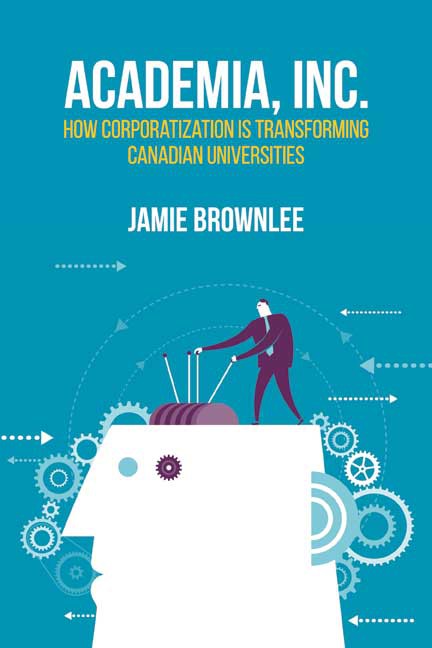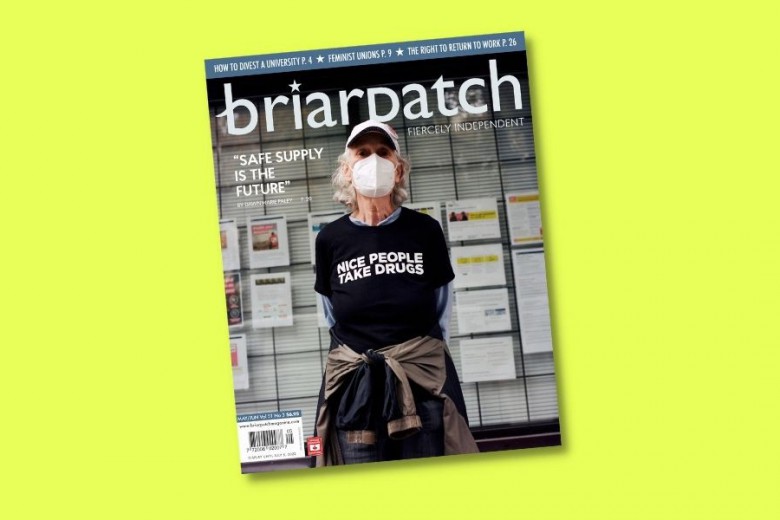
Academia, Inc.: How Corporatization is Transforming Canadian Universities
By Jamie Brownlee
Fernwood Publishing, 2015
As Canadian universities increasingly take on the neoliberal project, academics are fighting back the way they know how: with reasoned analysis, documented evidence, and thought-provoking critique. The latest contribution comes from Jamie Brownlee, a Carleton University scholar with roots in the University of Manitoba.
The fact that Brownlee chose to pursue a book project is a statement in itself. According to the market logic that has come to rule our campuses, books are inefficient. They take too long to create. The more popular the press, the less cachet it holds before faculty performance review committees. The fact that people read, learn, and gain enjoyment from books is immaterial. An acceptable publishing pedigree is based on the seldom-read journal articles that oil the metrics of a retooled, market-ready academic machine.
In this context, the mere existence of Academia, Inc.: How Corporatization Is Transforming Canadian Universities (Fernwood, 2015) is a provocation, and a welcome one. At risk to his own academic career, Brownlee has stepped outside the expected publishing path to take an important issue straight to the Canadian public: the hijacking of higher education by corporate thinking.
Academia, Inc. arrived on our shelves beside Polster and Newson’s A Penny for Your Thoughts: How corporatization devalues teaching, research, and public service in Canada’s universities (CCPA, 2015), and just in time for a ground-zero global gathering of concerned scholars and students held at the University of Regina in July (see politicsofevidence.ca). Meanwhile, on social media, the Facebook group TAB: Take Academia Back! has gathered more than 1,000 members since its founding in April.
Clearly, something is in the water. Brownlee opens with this thought, listing student and faculty protests that have been gathering steam around the globe. From Athens to Montreal, students are situating tuition increases as an outcome of unfettered capitalism, right alongside attacks on workers’ rights and environmental destruction.
What exactly are people defending? Canadian universities have long been tied to systemic power, passing from the hands of the church to the state, and now to the marketplace, Brownlee observes. Still, he argues, universities have retained a common core function as a social critic and conscience of society – and this is precisely why the public university is on the ropes today.
Having set the stage, Brownlee provides a chapter of backstory that traces the historical trajectory of the Canadian university toward “academic capitalism.” In the present state, universities are run like corporations, geared to maximize bums in seats and to meet industry needs for skilled workers and cheap R & D.
Subsequent chapters break down four major trends: the casualization of academic labour; the rise of the student-consumer; the introduction of corporate governance models; and corporate corruption of academic research. Although they don’t touch on every aspect (a full chapter on challenges to academic freedom seems warranted), together the chapters present a well-rounded picture of the current state.
The corporate governance chapter, “Managing Universities Like a Business,” is particularly well developed; Brownlee pulls out some hard data on presidential salaries to reveal the rise of a CEO-style managerial class. He mines funding recipient lists to illustrate the federal government’s penchant for construction contract delivery over education delivery. Indeed, the rise of highly paid executives and shiny new research labs points to an empire divorced from the educational needs of students, who toil daily to pay tuition and compete with hundreds of classmates for their professors’ attention.
The chapter on corruption stands out for its careful accounting of the impact of intellectual property (IP) management on institutional priority setting. Brownlee tracks an 80 per cent increase of university staff engaged in IP management between 1999 and 2008, for relatively minimal economic return. Meanwhile, the rush for patentable products generates corporate links that undermine the university’s singular stock in trade: unbiased, trustworthy research.
None of this paints a bright picture of the academy, leaving me eager to arrive at the final chapter on resistance. Of all the chapters, this was the least developed, perhaps pointing toward a follow-up book from Brownlee or others. After all, outside of Quebec, the resistance is relatively young in Canada; the story is still to be written.
Brownlee is particularly critical of tenured professors who remain silent. Even as a non-tenured professor, I found this critique initially discomfiting. But, on deeper reflection, I admit it is fair commentary, as I spend my days fretting over academic journal articles with all the joy of ripping off a bandage (“Has to be done…”), fully aware of a recent estimate that the average journal article is completely read by no more than 10 people. The book’s message is clear: if faculty and students are to shed their chains, the first link to break is the one forged by their own acquiescence.
I close with kudos to Fernwood, a publisher that specializes in transplanting social research seeds into the public garden, where they can actually take root and bear fruit. Without publishers willing to take this risk, the work of Brownlee and others would remain cloistered and suppressed.






